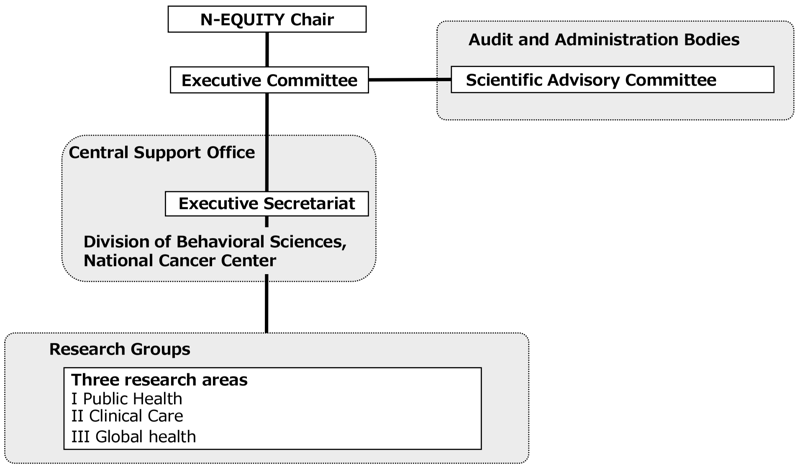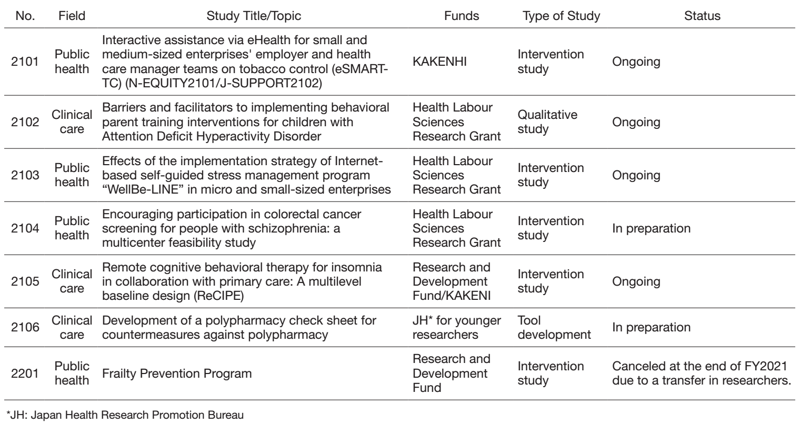Annual Report 2021
Division of Behavioral Sciences
Yosuke Uchitomi, Taichi Shimazu, Maiko Fujimori, Junko Saito, Aki Otsuki, Akiko Yaguchi-Saito, Miyuki Odawara, Yuki Kaji, Haruhiko Imamura, Rina Miyawaki, Keiichi Yuwaki, Hanako Saito
Introduction
In April 2020, a research division dealing with behavioral sciences was established for the first time at the National Cancer Center. There have been remarkable developments in technological innovation and drug development in cancer treatment. However, despite the fact that human behavior is deeply involved in all healthcare activities, including cancer prevention, early detection, diagnosis, treatment, and survivorship care, there was no department that dealt with the underlying behavior. Behavioral science and behavioral medicine have only just begun to be included in the core curriculum of medical education at universities nationwide.
The Team and What We Do
The goal of the Division of Behavioral Sciences is to develop individualized behavioral interventions and to create new evidence. Through dialogue, we will develop effective behavioral interventions that are tailored to the diversity of individuals. We will also use implementation science methods to develop strategies to steadily and quickly scale up evidence-based, precise behavioral interventions nationwide.
Research activities
1. National Center Consortium in Implementation Science for Health Equity, N-EQUITY
N-EQUITY is a collaboration of six national centers working together to implement and support implementation research projects in the areas of public health, clinical care, and global health (Figure 1). A Scientific Advisory Committee consisting of external experts was established to review protocols for implementation research. In FY2021, six new N-EQUITY research proposals were approved (No. 2102, 2103, 2104, 2105, 2106, and 2201) (Table 1).
Figure 1. Organization of N-EQUITY (since December 2019)

Table 1. N-EQUITY Approved Studies (2019-2022.3)

2. Implementation Research for Tobacco Control Measures in Workplaces
We started recruiting participants for a cluster randomized controlled trial in July 2021 (eSMART-TC [N-EQUITY2101/J-SUPPORT2102]). The objective of this study was to test whether interactive six-month interventions for employers and health managers through online sessions using behavioral change techniques to promote the implementation of tobacco control measures increase successful smoking cessation among employees compared to the absence of such interventions.
3. INFORM Study
A mail questionnaire survey of 10,000 randomly selected people aged 20 and older was conducted to identify ways to deliver useful information on cancer prevention and medical care (INFORM Study 2020). We fixed the data from this survey and started to analyze it. We also developed a plan to conduct a survey on living with cancer in 2023 using the same study design (INFORM Study 2023).
Clinical trials
Interactive assistance via eHealth for small and medium-sized enterprises' employer and health care manager teams on tobacco control (N-EQUITY2101/J-SUPPORT2102) (UMIN000044526)
Education
We supervised the research of three Master course students.
The Group for Supportive Care and Survivorship Research at the National Cancer Center Institution for Cancer Control held ten “Implementation Science Seminars” and ten “Behavioral Science Seminars.”
Future Prospects
This division will promote behavioral science research related to public health and clinical practices, including cancer prevention, early detection, diagnosis, treatment, and survivorship care. We will also contribute to the generation of evidence for implementation science. This will lead to the implementation of behavioral interventions for those who have difficulty accessing healthcare and for communities with few medical resources.
List of papers published in 2021
Journal
1. Saito J, Odawara M, Takahashi H, Fujimori M, Yaguchi-Saito A, Inoue M, Uchitomi Y, Shimazu T. Barriers and facilitative factors in the implementation of workplace health promotion activities in small and medium-sized enterprises: a qualitative study. Implementation science communications, 3:23, 2022
2. Yuwaki K, Kuchiba A, Otsuki A, Odawara M, Okuhara T, Ishikawa H, Inoue M, Tsugane S, Shimazu T. Effectiveness of a Cancer Risk Prediction Tool on Lifestyle Habits: A Randomized Controlled Trial. Cancer epidemiology, biomarkers & prevention, 30:1063-1071, 2021
3. Fujiwara M, Yamada Y, Shimazu T, Kodama M, So R, Matsushita T, Yoshimura Y, Horii S, Fujimori M, Takahashi H, Nakaya N, Kakeda K, Miyaji T, Hinotsu S, Harada K, Okada H, Uchitomi Y, Yamada N, Inagaki M. Encouraging participation in colorectal cancer screening for people with schizophrenia: A randomized controlled trial. Acta psychiatrica Scandinavica, 144:318-328, 2021
4. Sasaki N, Obikane E, Vedanthan R, Imamura K, Cuijpers P, Shimazu T, Kamada M, Kawakami N, Nishi D. Implementation Outcome Scales for Digital Mental Health (iOSDMH): Scale Development and Cross-sectional Study. JMIR formative research, 5:e24332, 2021
5. Etoh T, Fujiwara M, Yamada Y, Wada R, Higuchi Y, Inoue S, Kodama M, Matsushita T, Yoshimura Y, Horii S, Fujimori M, Kakeda K, Shimazu T, Nakaya N, Tabata M, Uchitomi Y, Yamada N, Inagaki M. Cancer care for people with mental disorders: A qualitative survey among cancer care and psychiatric care professionals in Japan. Psycho-oncology, 30:2060-2066, 2021
